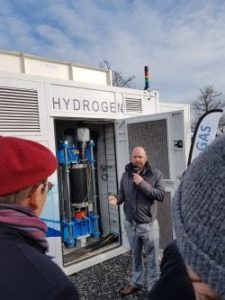Unleashing the Power: How Hydrogen Transforms into Energy?

Introduction
In the quest for cleaner and more sustainable energy sources, hydrogen has emerged as a promising contender. Its potential as a clean, highly efficient fuel has sparked a surge in research and development surrounding hydrogen-related technologies. In this article, we’ll explore the fascinating process of how hydrogen is transformed into energy, uncovering the mechanisms that underpin this revolutionary energy conversion.
Understanding Hydrogen
Before delving into the intricacies of hydrogen’s transformation into energy, it’s crucial to grasp the fundamental characteristics of this element. Hydrogen, the lightest and most abundant element in the universe, consists of a single proton and electron. Although it is a colorless, odorless gas at standard conditions, hydrogen exhibits high reactivity when combined with other elements.
Hydrogen Production
The production of hydrogen is a critical first step in the energy conversion process. Currently, hydrogen is primarily produced through steam methane reforming, a process that involves reacting natural gas with steam. However, this method has associated carbon emissions, compromising its environmental sustainability. To achieve a true energy revolution, cleaner hydrogen production methods are being explored.
One promising approach is electrolysis, which uses electricity to split water molecules into hydrogen and oxygen. Electrolysis can be powered by renewable energy sources like solar or wind power, making it a more sustainable option. Additionally, advanced techniques such as biomass gasification and thermochemical water splitting are being researched to diversify hydrogen production methods.
Storage and Transportation of Hydrogen
Hydrogen is a highly volatile gas, necessitating safe storage and transportation methods. Currently, there are various approaches to hydrogen storage, including compression, liquefaction, and solid-state absorption. Compressed hydrogen is stored in high-pressure tanks, while liquefied hydrogen requires cryogenic temperatures. Solid-state storage materials, such as metal hydrides and carbon nanotubes, offer potential solutions for compact and efficient hydrogen storage.
In terms of transportation, hydrogen can be transported as a gas via pipelines or as a liquid in cryogenic tanks. Furthermore, the concept of a hydrogen energy carrier, such as ammonia or methanol, is being explored to simplify hydrogen transportation and expand its reach.
Harnessing Energy: Fuel Cells
The direct conversion of hydrogen into energy is achieved through fuel cells. Fuel cells are electrochemical devices that generate electricity by combining hydrogen with oxygen. Within a fuel cell, hydrogen is separated into protons and electrons at the anode, with the protons passing through a membrane while the electrons are directed through an external circuit, creating an electric current. At the cathode, oxygen reacts with the protons and electrons, resulting in the formation of water.
Fuel cells offer high efficiency, low emissions, and quiet operation, making them a promising energy conversion technology. They have diverse applications, including transportation (e.g., fuel cell vehicles), stationary power generation, and portable electronics. Ongoing research aims to enhance fuel cell performance, durability, and cost-effectiveness to accelerate their widespread adoption.
The Role of Hydrogen in Energy Systems
Hydrogen’s versatility positions it as a key player in future energy systems. Its applications extend beyond transportation and power generation. Hydrogen can be utilized for energy storage, enabling the integration of renewable energy sources into the grid by storing excess energy and supplying it during periods of high demand. Additionally, hydrogen can serve as a feedstock in various industries, including the production of ammonia and other chemicals.
Conclusion
As the world strives for a greener and more sustainable future, hydrogen stands at the forefront of energy transformation. From its production and storage to its utilization in fuel cells, hydrogen offers a promising path towards decarbonization and energy independence. As research and technological advancements continue, we anticipate witnessing the widespread adoption of hydrogen as a clean, efficient, and versatile energy source.

























